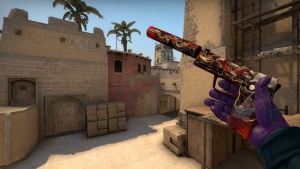Gambling in Video Games
With the rise of using unlockable content as sources of income for the modern video game market, many modern video games have adopted a monetary system where players can acquire cosmetic game content in the form of texture redesigns for in-game items typically called “skins." [1] Often through some form of loot box with variable odds for random items, players can acquire different skins to customize how various items in their chosen game appear. [2] Loot boxes are typically purchased with real money on their own or by the buying of keys to open them. [3] However, certain games also allow the player to unlock forms of loot boxes with experience points which can be acquired through the continual playing of the game. [4] Some games also allow users to unlock skin content through using real-life money directly or purchasing game-specific currency that can be used in a similar fashion. These types of transactions are typically referred to as in-game micro-transactions. [5]
After acquiring these skins, players can then choose to use these skins instead of the default textures that the game presents to them. How skins can change the appearance of the game can vary from changes in clothing to avatars and even weapon camouflages in first-person shooter games. These skins can be purely cosmetic and provide no in-game utility to the player or allow the player to more easily advance in the game. [6] However, players typically aim to acquire skins of a higher rarity because of their low drop rates. [7] The acquisition of these skins through loot boxes has led to debates about them being a gateway to more traditional forms of gambling. [8] Similar to other casino games like slots and roulette, the player pays to get a random chance of potentially winning and profiting from their down payment or losing it all. Ethical implications regarding underage gambling and gambling addiction have also been growing concerns with the fewer amounts of gambling regulations in the gaming industry. [9]
Contents
Virtual Currency and Marketplaces
Along with the rise of skins within game systems, game-centered markets have also been formed to further monetize how players can interact with skins. One of these marketplaces has been the Steam community market. In this marketplace, players can create listings for their cosmetic skins and also buy skins from other players. These transactions create value for each individual skin, often based on their popularity and variety. The values of these skins can range from pennies to thousands of dollars. [10] In this form, skins are a form of virtual currency that players collect and exchange with each other.
Beginnings
In 2012, video company Valve introduced skins to their popular titles of Team Fortress 2 and Counter-Strike Global Offensive. These skins were added in an attempt to increase player engagement, and along with the addition of their community marketplace, they were immensely sought after by a variety of players. [11] In Team Fortress 2, these skins took the form of cosmetic hats and clothing that the characters could wear, and in Counter-Strike Global Offensive, they were brightly colored weapon camouflages. Along with their unique designs that appealed to their player bases, Valve assigned specific rarity values to each skin added into the games that determined the probability that a player would be able to unlock the item through a loot box. [12] These loot boxes could be randomly received through playing the game. However, the player would have to use real money to purchase the keys to unlock them. After using a key with a crate, it would consume both items to unlock a random skin.
As games have continued to develop from their early era, the use of loot boxes to acquire various in-game items including skins has become increasingly commonplace. A study conducted in 2020 on the presence of loot boxes in mobile games on both Android and Apple platforms as well as in desktop games on popular gaming platform Steam showed that 58% of top-grossing Android games, 59% of top-grossing Apple games, and 36% of the most popular games on Steam contained a form of a loot box. [13]
Loot Boxes
Loot boxes are another form of virtual item that can be opened by players to redeem a random selection of in-game items, which often include skins and other virtual cosmetics. Varying from game to game, these boxes can be opened after retrieving them or by forms of digital keys that players can purchase separately.a [14] After unlocking each box, there is a small probability that the player will retrieve a well sought-after rare item. Much similar to more conventional gambling methods, there is a chance that a player may win big or lose out on their investment.
Many games offer these loot boxes as free-to-play rewards for playing the game. However, players can also often purchase these loot boxes with in-game currencies or external funds. On the other hand, if the game requires keys to open the loot boxes, they are typically purchased separately. [15] Opening these loot boxes has also become a form of entertainment as well, with content creators uploading videos of themselves opening large amounts of boxes. One of them is YouTuber Prodigy, who opened 12,000 loot boxes from Counter-Strike Global Offensive. [16]
Esports Betting
Stemming from the popularity of competitive esports, esports betting became a popular form of digital gambling within video games in 2016. Changes in regulations over recent years have forced many websites to abandon skin gambling directly. [17] However, previously, on third-party websites like CS:GO Lounge, players could gamble their virtual skins on the outcomes between teams of professional esports games. [18] This brought to light many scandals around esports betting, including the iBUYPOWER match-fixing scandal where players on the team iBUYPOWER purposely lost a match to receive large sums of personal earnings from betting against themselves. [19]
Third-party gambling websites
Over the years, third-party gambling websites where players can gamble their in-game skins have also gained popularity among gamers. Players can deposit their skins and choose a variety of casino games to play in an attempt to gain winnings. Some of these games include roulette, coin flip, jackpot, and case opening. These websites gained massive popularity in 2015-2016, as an estimated $2.3 billion was spent on skin betting in 2015 and $5 billion was spent in 2016. [20] Controversy surrounding these third-party gambling websites also arose when streamer and former pro player Mohamed "m0E" Assad threatened his gambling website sponsor CS:GO Diamonds that he would expose their malicious fixing of gambling games for marketing and entertainment if he was not properly compensated for his sponsorship. In a separate case, YouTubers "TmarTn" and "ProSyndicate" were also exposed for marketing the gambling website of CSGO Lotto without being transparent of their ownership of the website. [21]
Ethical Implications
Underage Gamblings
As these games are marketed to younger generations, both in-game gambling methods like loot boxes as well as other third-party gambling websites bring out ethical concerns about underage gambling. As skins are not considered to be actual money being gambled, there are no government laws in place that prevent younger individuals from partaking in these gambling-like activities. [22] Underage minors can freely partake in these gambling activities without a complete understanding of the system. Experts state that this is even more concerning as peer pressure to obtain rare skins may influence younger individuals even more into partaking in these activities. However, over the years, certain measures have been established to control the digital gambling of skins such as blocking certain sites and establishing age requirements. [23] However, the presence of loot box gambling still remains prevalent within major games.
References
- ↑ https://www.sciencedirect.com/science/article/pii/S0747563222000413?casa_token=F5C9nqsULswAAAAA:3gSkXrF3Wd4qjqV-5t-b9GEX9hFWL2lGGvKVxiHFuoDtczGM53ycXcWR948c9hFk6fWYmi0zxA#bib31
- ↑ https://onlinelibrary.wiley.com/doi/full/10.1111/add.14973?casa_token=Ih0mMbUMTGMAAAAA%3AckR5WHGMJ2DWxDY_HaMPhVEBE0iJHVJ_0vcpFIOzgX4GYXpQi5fJsyHwIAihmIWAon_Gn6IXOQq1s8aO
- ↑ https://www.liebertpub.com/doi/full/10.1089/glr2.2018.2216
- ↑ https://www.sciencedirect.com/science/article/pii/S0747563222000413?casa_token=F5C9nqsULswAAAAA:3gSkXrF3Wd4qjqV-5t-b9GEX9hFWL2lGGvKVxiHFuoDtczGM53ycXcWR948c9hFk6fWYmi0zxA#bib31
- ↑ https://www.sciencedirect.com/science/article/pii/S0747563222000413?casa_token=F5C9nqsULswAAAAA:3gSkXrF3Wd4qjqV-5t-b9GEX9hFWL2lGGvKVxiHFuoDtczGM53ycXcWR948c9hFk6fWYmi0zxA#bib31
- ↑ https://www.liebertpub.com/doi/full/10.1089/glr2.2018.2216
- ↑ https://www.liebertpub.com/doi/full/10.1089/glr2.2018.2216
- ↑ https://onlinelibrary.wiley.com/doi/full/10.1111/add.14973?casa_token=Ih0mMbUMTGMAAAAA%3AckR5WHGMJ2DWxDY_HaMPhVEBE0iJHVJ_0vcpFIOzgX4GYXpQi5fJsyHwIAihmIWAon_Gn6IXOQq1s8aO#add14973-bib-0001
- ↑ https://www.sciencedirect.com/science/article/pii/S0747563222000413?casa_token=F5C9nqsULswAAAAA:3gSkXrF3Wd4qjqV-5t-b9GEX9hFWL2lGGvKVxiHFuoDtczGM53ycXcWR948c9hFk6fWYmi0zxA#bib31
- ↑ https://steamcommunity.com/market/search?appid=730#p1_price_desc
- ↑ https://en.wikipedia.org/wiki/Skin_gambling
- ↑ https://counterstrike.fandom.com/wiki/Skins#Skin_Quality:
- ↑ https://onlinelibrary.wiley.com/doi/full/10.1111/add.14973?casa_token=Ih0mMbUMTGMAAAAA%3AckR5WHGMJ2DWxDY_HaMPhVEBE0iJHVJ_0vcpFIOzgX4GYXpQi5fJsyHwIAihmIWAon_Gn6IXOQq1s8aO#add14973-bib-0001
- ↑ Wikipedia Contributors. (2022, January 12). Loot box. Wikipedia; Wikimedia Foundation. https://en.wikipedia.org/wiki/Loot_box
- ↑ Wikipedia Contributors. (2022, January 12). Loot box. Wikipedia; Wikimedia Foundation. https://en.wikipedia.org/wiki/Loot_box
- ↑ Prodigy. (2021). 12,000x CSGO CASES!? WORLD RECORD OPENING (CRAZY KNIVES) [YouTube Video]. In YouTube. https://www.youtube.com/watch?v=jvbqhoCQEZ0
- ↑ Raven, J. (2016, October 4). CS:GO Lounge handled over $1 billion in bets this year. Dot Esports; Dot Esports. https://dotesports.com/counter-strike/news/csgo-lounge-billion-bets-3896
- ↑ Yin-Poole, W. (2016, August 17). CS:GO Lounge drops skin gambling following Valve crackdown. Eurogamer.net; Eurogamer.net. https://www.eurogamer.net/articles/2016-08-17-cs-go-lounge-drops-skin-gambling-following-valve-crackdown
- ↑ North American match fixing scandal. (2021). Liquipedia Counter-Strike Wiki. https://liquipedia.net/counterstrike/North_American_match_fixing_scandal
- ↑ Wikipedia Contributors. (2022, January 15). Skin gambling. Wikipedia; Wikimedia Foundation. https://en.wikipedia.org/wiki/Skin_gambling
- ↑ Leslie, C. (2016, July 26). The CS:GO gambling scandal: Everything you need to know. Dot Esports; Dot Esports. https://dotesports.com/counter-strike/news/csgo-gambling-scandal-explained-3545
- ↑ Skin betting and video games. What are they and how does it work. (2019, May 2). Videogames.org.au. https://www.videogames.org.au/skin-betting/
- ↑ Wikipedia Contributors. (2022, January 15). Skin gambling. Wikipedia; Wikimedia Foundation. https://en.wikipedia.org/wiki/Skin_gambling

